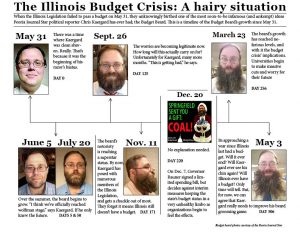On rebootillinois.com there’s a Illinois budget impasse timer which counts off the days, hours, minutes and seconds that the state has been budgetless.
At midnight May 9, that timer marked 312 days and 18 hours that Illinois has been without a budget.
Yet, what have those 312 days and 18 hours (and counting, mind you) wrought? A lot of blame placing and wasted time.
In a Chicago Tribune article from March 30, Illinois Governor Bruce Rauner actively voiced his blame towards the Democrat-majority Illinois Legislature as to why the budget crisis has carried on for so long, which may Chicago State University and other to close their doors.
“I believe that the supermajority in the legislature is using Chicago State and many other service providers in Illinois as leverage to try to force a massive tax hike,” Rauner said in the article. “I believe that’s what’s going on, and that’s wrong.”
The “other service providers” Rauner is referring to are the 108 organizations statewide which depend on the state government for funding, and have either been closing their doors or scrambling to find other ways to prop their doors open.
“I think everyone assumed it would be a couple months and we were good there,” Barb Hailey, the Director of Communications and Advancement for the Lutheran Social Services of Illinois (LSSI), said. “When it started to drag on, we had to start (saying) ‘okay, we need to come up with a plan.”
Organizations like the LSSI have been of the less fortunate kind. The LSSI themselves have had to cut 750 jobs and close 30 of their programs throughout the state because of the lack of funding from the government.
“On a personal level, it is frustrating,” Hailey said. “Passing a budget is one of the basic responsibilities of a state government. It is frustrating that there hasn’t been able to be an agreement reached on that.”
Peoria Journal Star political reporter Chris Kaergard’s time with the budget beard is wildly documented here.
While the LSSI has been struggling with keeping closing their doors in many different locations, smaller, more remote based organizations, such as the Center for Prevention of Abuse, are staying afloat through extreme generosity.
“Luckily, we have leadership here and a good board of directors who have really done a good job of building up reserves and saving money for a rainy day,” Shaun Newell, Director of Marketing and Communications at the Center for Prevention of Abuse (CPA), said. “Of course, it’s raining right now.”
While the CPA hasn’t received funding either from the state, they’ve stayed afloat in these budgetless times by the generosity of others.
“We constantly look for individual donors and corporate sponsorships,” Newell said. “That helps us get through situations like this, by going out and soliciting donations from individuals and from businesses that try and offset some of the expenses.”
However, there are plenty of other organizations, like the LSSI, which aren’t as lucky as the CPA. A big victim have been state universities, who receive most, if not all in some cases, of their funding from the state government.
https://soundcloud.com/chris-kwiecinski/425-final
“Many of us, myself included, are actual graduates of Eastern,” Vicki Woodard, the Coordinator of Public Information at Eastern Illinois Unviersity said. “We really have a deep love for the place, and it’s hard to watch something you love struggle.”
Another education factor in the budget crisis are Monetary Award Program (MAP) grants, which are key factors in some cases in sending students to higher education.
According to the Wall Street Journal, 1,000 Illinois college and university students didn’t return for the spring semester in 2016 because state universities weren’t able to foot the bill for student’s MAP grants.
“I think this is going to affect universities as a whole in Illinois for years to come,” Woodard said. “I think it’s going to take some time to rebuild, to grow and regain confidence in the state.”
Still, Hailey believes she and the LSSI can rest easier at this point in the budget crisis.
“We feel that the worst case scenario is behind us in terms of what we already have to do,” Hailey said. “It was really an agonizing decision, deciding what programs to close. But in the end, the ones we ended up eliminating were directly linked to non-payment from the state.”
